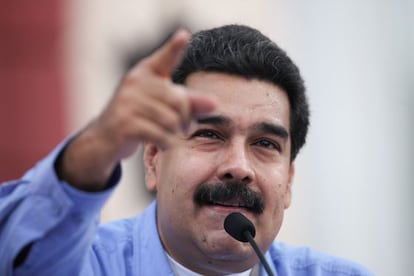Venezuela’s Maduro creates major new body to fight corruption
President’s new organization will have power to investigate and punish corrupt individuals

The year-long period that Venezuela’s National Assembly granted President Nicolás Maduro to govern by executive decree expired at midnight on Wednesday. Maduro dedicated the two nights before the deadline ended to implementing fiscal reforms and security measures by amending current laws or passing new ones. Among the most notable changes is the creation of the National Anti-Corruption System and the Popular System for the Defense of Peace and the Integrity of the Homeland.
The administration will publish the laws in its Official Gazette in the next few days and establish the reach of the new measures. But the explanations the head of state gave when he announced the provisions of the new laws hint at some of his concerns. The administration needs to send a strong message to distance itself from the cases of corruption denounced by dissident groups, which have their origin in the wide margin between the official value of the dollar and its price on the black market.
Maduro has said the new anti-corruption organization will report directly to the president’s office and will operate at the same level as the Prosecutor General’s Office and courts. “I need honesty warriors,” Maduro said in reference to the qualities of the individuals he wants to see appointed to the group. The new body will be able to investigate and sanction those individuals who in its opinion have committed acts of corruption.
The anti-corruption organization will report directly to the president’s office
This announcement forms part of a reform of the law against corruption, which removes statutes of limitations on crimes relating to state funds. Maduro showed an organizational chart that outlines how this anti-corruption police will operate. The group will make its decisions based on information provided by the regime’s organizations, information dispatched from a financial intelligence center and with the support of the controversial Strategic Center for Security and Protection of the Homeland (CESPPA), an office the respected scholar Antonio Pasquali defines as a center for spying. Maduro justified the measure with one of the many key phrases he repeated during his almost two-hour speech: “Socialism is not possible if there is corruption.”
Soon after, the president announced the creation of the Popular System for the Defense of Peace and the Integrity of the Homeland. Though the administration offered few details about the new agency, the motive behind its creation was clear: to fight “terrorism and to safeguard the lives of all Venezuelans,” and to guarantee “the defeat of the paramilitary threat that has settled in Venezuela as a result of far-right terrorism.”
Maduro also completed the announcements that he began a week before with the appointment of his party’s deputy, Freddy Bernal, as president of a commission tasked with restructuring Venezuela’s police forces. The president signed a new law “for the police revolution” that will kick-start a process aimed at combating crime through preventive social measures. Over the last 16 years, the Bolivarian Revolution has been unable to halt the rise in violence and the infiltration of criminals into the police, or to prevent security agents from carrying out practices that violate human rights.
Translation: Dyane Jean François
Tu suscripción se está usando en otro dispositivo
¿Quieres añadir otro usuario a tu suscripción?
Si continúas leyendo en este dispositivo, no se podrá leer en el otro.
FlechaTu suscripción se está usando en otro dispositivo y solo puedes acceder a EL PAÍS desde un dispositivo a la vez.
Si quieres compartir tu cuenta, cambia tu suscripción a la modalidad Premium, así podrás añadir otro usuario. Cada uno accederá con su propia cuenta de email, lo que os permitirá personalizar vuestra experiencia en EL PAÍS.
¿Tienes una suscripción de empresa? Accede aquí para contratar más cuentas.
En el caso de no saber quién está usando tu cuenta, te recomendamos cambiar tu contraseña aquí.
Si decides continuar compartiendo tu cuenta, este mensaje se mostrará en tu dispositivo y en el de la otra persona que está usando tu cuenta de forma indefinida, afectando a tu experiencia de lectura. Puedes consultar aquí los términos y condiciones de la suscripción digital.








































